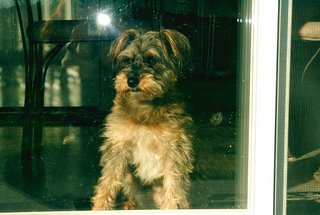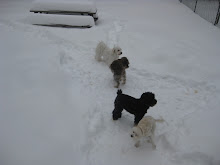
Winter pet safety
By Michelle Hatt, RN, COHN(C)
When temperatures are chilly and the ground is damp, your pet needs a little extra care from you.
If you need to bundle up, so does your pet! In very cold weather, put a warm coat on your short-haired dog and take short walks (only a few minutes).
Long-haired dogs should not be outside for more than 20 minutes in very cold weather. They are just as susceptible to sudden temperature changes as you are.
Animals can suffer from frostbite and hypothermia even in early winter. Frostbite is most common on your pet's paws. Symptoms of frostbite may not appear until a couple of days after exposure. Signs to watch for are swollen paws and your pet fussing over the area. If this happens, take your pet to your veterinarian immediately. On the way, wrap your pet in dry warm blankets and apply a warm (not hot) water bottle to the affected area.
If your dog is outside with you a lot in the winter, he will need more calories to produce body heat, so increase the amount you feed him. Keep plenty of fresh, UNFROZEN water available. Use plastic, ceramic or heater bowls, since your pet's tongue on a metal dish left outside could freeze in a couple of seconds.
If your pet gets very little exercise during the winter, decrease his calorie intake to avoid excess weight gain.
Antifreeze tastes good to pets, but it is a deadly poison. Keep an eye out for antifreeze puddles. If you suspect your pet has ingested antifreeze, rush him to your veterinarian immediately. The most likely source of the poison is a radiator drainage spot in a garage or parking area, which should be flushed with water immediately.
When you are outside with your pet, watch out for chemicals used to melt snow on sidewalks,
as they irritate your pet's paws. Always remember to wipe his paws with a wet cloth after an
outing and remove the ice between his paw pads. If your dog's paws look sore or irritated, apply
a thin coat of petroleum jelly. You can also purchase commercial boots to protect his paws from the elements.
Slap the hood of your car or honk the horn a few times before starting the engine on cold days
to startle any animals sleeping under your car. Cats may crawl up under your car seeking shelter and warmth near the engine. They may become caught in the fan belt and suffer serious injury when someone starts the engine.
Remember, if it's too cold for you to go outside, then it's too cold for your pet
Source: Toronto Humane Society
Wednesday, January 10
We got lots of snow - I am staying in - by Jessie
Posted by
Jessie, Jake and Lola
at
1/10/2007 05:40:00 AM
![]()
Subscribe to:
Post Comments (Atom)



7 comments:
Hey Jessie,
I like the part that says you need to eat more to produce body heat!!! Bless the person who came up with this one!
We saw flurries here today at my house but they were gone in 10 minutes.
Hugs,
Maggie
Hi there! We were quite excited to find another schnoodle blogging. We're bookmarking you now! I'm a schnoodle too. Come visit us sometime at BloggingDoggie.com :)
Thanks for those important tips.
Hi Jessie,
I think it was real nice of you to share those safety info. with your friends.. I only wish we had cold weather in tropical Singapore cos it gets too hot sometimes (like now)!!
Jessie, That's really good advice.
~ fufu
Great post.
I love the eating more part too!
XOXOXO
Chelsea
wow, is that mean no running around time for you two? that sucks!
wet wet licks
Boo
Post a Comment